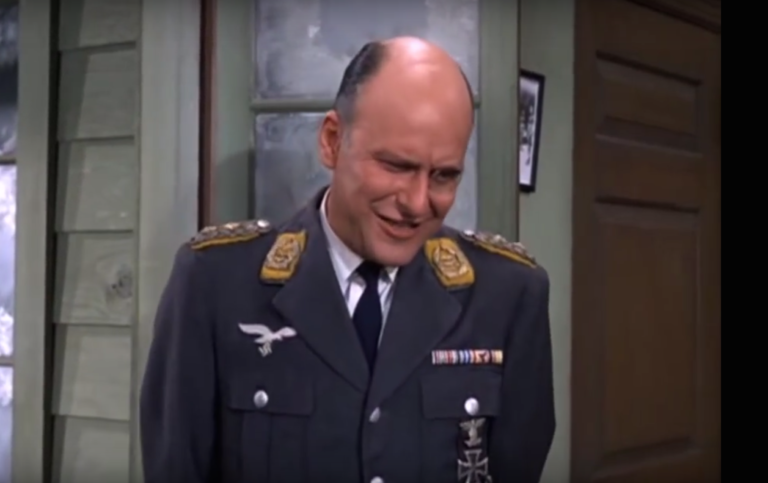
My office today is a return to my favorite library and this view of the rolling hills behind it.
I love this place.
 This afternoon, I am listening to Anton Bruckner’s Symphony No. 4 in E Flat Major (WAB 104), nicknamed “Romantic,” interpreted by German-born conductor and composer Otto Klemperer (1885-1973).
This afternoon, I am listening to Anton Bruckner’s Symphony No. 4 in E Flat Major (WAB 104), nicknamed “Romantic,” interpreted by German-born conductor and composer Otto Klemperer (1885-1973).
Prior to this Bruckner project, I had never heard of Otto Klemperer – although I had heard of his son, actor Werner Klemperer, most famous for his portrayal of Col. Klink, Kommandant of Stalag 13 in the 1960s TV series Hogan’s Heroes. However, I did not know Werner’s dad was Otto Klemperer until this afternoon.
 I never really liked Hogan’s Heroes because I couldn’t find the humor in a POW camp in Nazi Germany.
I never really liked Hogan’s Heroes because I couldn’t find the humor in a POW camp in Nazi Germany.
Still, I thought Werner Klemperer did a fine job as Col. Klink.
But that brings me back to today’s performance of Bruckner’s Fourth, interpreted by the elder Klemperer, Otto.
From his entry on Wikipedia,
Otto Klemperer (1885-1973) was a German-born conductor and composer. He is widely regarded as one of the leading conductors of the 20th century.
Otto Klemperer was born in Breslau, Silesia Province, then in Germany (now Wrocław, Poland), as a son of Nathan Klemperer, a native of Prague, Bohemia (today’s Czech Republic). His parents were Jewish. Klemperer studied music first at the Hoch Conservatory in Frankfurt, and later at the Stern Conservatory in Berlin under James Kwast and Hans Pfitzner. He followed Kwast to three institutions and credited him with the whole basis of his musical development. In 1905 he met Gustav Mahler while conducting the off-stage brass at a performance of Mahler’s Symphony No. 2, Resurrection. He also made a piano reduction of the second symphony. The two men became friends, and Klemperer became conductor at the German Opera in Prague in 1907 on Mahler’s recommendation. Mahler wrote a short testimonial, recommending Klemperer, on a small card which Klemperer kept for the rest of his life. Later, in 1910, Klemperer assisted Mahler in the premiere of his Symphony No. 8, Symphony of a Thousand.
Klemperer went on to hold a number of positions, in Hamburg (1910–1912); in Barmen (1912–1913); the Strasbourg Opera (1914–1917); the Cologne Opera (1917–1924); and the Wiesbaden Opera House (1924–1927). From 1927 to 1931, he was conductor at the Kroll Opera in Berlin. In this post he enhanced his reputation as a champion of new music, playing a number of new works, including Janáček’s From the House of the Dead, Schoenberg’s Erwartung, Stravinsky’s Oedipus rex, and Hindemith’s Cardillac.
On March 22, 1920 his wife soprano Johanna Geisler gave birth to their son, the German-American actor Werner Klemperer.
Many listeners associate Klemperer with slow tempos, but recorded evidence now available on compact disc shows that in earlier years his tempi could be quite a bit faster; the late recordings give a misleading impression.
Regardless of tempo, Klemperer’s performances often maintain great intensity, and are richly detailed.
Maestro Klemperer’s orchestra is the Philharmonia Orchestra.
From the orchestra’s entry on Wikipedia,
The Philharmonia Orchestra is a British orchestra based in London. It was founded in 1945 by Walter Legge, a classical music record producer for EMI. Since 1995, the orchestra has been based in the Royal Festival Hall. The Philharmonia also has residencies at De Montfort Hall, Leicester, the Corn Exchange, Bedford, and The Anvil, Basingstoke. Esa-Pekka Salonen has been the orchestra’s principal conductor and artistic advisor since 2008, and Vladimir Ashkenazy and Christoph von Dohnányi both conduct the Philharmonia Orchestra regularly.
The Philharmonia Orchestra tours widely, regularly welcomes top soloists and conductors, and performs more than 160 concerts a year, as well as recording music for films and computer games. Performing more than 35 concerts a year at Royal Festival Hall, the orchestra notably presents premieres of contemporary works, along with the classics. Since its inception in 1945, the Philharmonia has commissioned more than 100 compositions from composers that include Sir Harrison Birtwistle, Sir Peter Maxwell Davies, Mark-Anthony Turnage and James MacMillan.
Speaking of Walter Legge, this recording was produced by Legge.
Here are the objective aspects of today’s recording:
 Bruckner’s Symphony No. 4 in E Flat Major (WAB 104), composed 1873-1874
Bruckner’s Symphony No. 4 in E Flat Major (WAB 104), composed 1873-1874
Otto Klemperer conducts
Klemperer used the “1886” version, edited by Nowak, according to the back of the CD sleeve
Philharmonia Orchestra plays
The symphony clocks in at 61:01
This was recorded in London, England, on 18-20 and 24-26 in November of 1963
Klemperer was 78 when he conducted it
Bruckner was 50 when he finished composing it (the first time)
This recording was released on the Warner Classics label
Bruckner wrote his symphonies in four movements. The time breakdown of this one (Symphony No. 4 in E Flat Major), from this particular conductor (Klemperer) and this particular orchestra (Philharmonia Orchestra) is as follows:
I. Bewegt, nicht zu schnell……………………………………………………………………16:06
II. Andante, quasi allegretto…………………………………………………………………13:55
III. Scherzo. Bewegt (With motion) – Trio: Nicht zu schnell (Not too fast)……………………………………………………………………………………………………….11:44
IV. Finale: Bewegt, doch nicht zu schnell (With motion, but not too fast)……………………………………………………………………………………………………….19:02
Total running time: 61:01
Of the 1886 version, this is what Wikipedia has to say about it,
The 1886 version is the same as the 1881 version but includes a number of changes made by Bruckner while preparing a score of the symphony for Anton Seidl, who took it with him to New York City. This version was published in an edition by Nowak in 1953, based on the original copyist’s score, which was rediscovered in 1952 and is now in the collection of Columbia University. In the title of Nowak’s publication, it was confusingly described as the “1878-1880 version”. It was performed in New York by Seidl on 4 April 1888.
From the liner notes, written by Richard Osborne,
Klemperer’s Bruckner: ‘never a moment too long’
It was through the works of Anton Bruckner that Otto Klemperer first became know to a wider national and international public as a symphonic conductor. During the 1920s, the epic Eighth Symphony became his musical visiting card.
Okay. Now, here are the subjective aspects of today’s recording:
My Rating:
Recording quality: 5
Overall musicianship: 5
CD liner notes: 2 (typically thin Warner Classics fare – very short essays about Klemper and Bruckner)
How does this make me feel: 5
“Huzzah!”
This was a rich, vibrant, transcendent performance!
Despite the age of this recording (it’s 53 years old!), it sounded remarkably fresh and dynamic.
I don’t even know where to begin to extol the virtues of this recording. The instruments are amazing. So well recorded! I heard things this time that I never noticed before, like the flute at the start of the Scherzo (Movement III). I was also totally caught up in the last 2-3 minutes of the Finale. I mean, to the hilt.
This was one of those rare recordings in which there is depth, space between the instruments, a kind of 3D quality to it that offers plenty of places for my mind to wander in and amongst the instruments.
During my assessment of Wilhelm Furtwangler (Day 20) I assumed only he was old enough to have been alive when Bruckner was.
Not so.
Otto Klemperer was born in 1885. Bruckner died in 1896 – 11 years after Otto was born. (Furtwangler was born in 1886, which means Otto Klemperer had been alive more years during Bruckner’s life than Furtwangler had.)
Maestro Klemperer’s life story sounds like a tragedy. He overcame several very serious physical challenges (including a brain tumor the size of a small orange), was passed over twice as lead conductor in New York and Philadelphia, two decisions that affected him deeply.
Yet, he continued on, sometimes from a wheelchair, sometimes with a crushed spirit, sometimes battling manic-depression.
Anyone who can overcome all those setbacks and still produce works of beauty deserve a lot of respect in my book.
I think this is one of the reasons why I like Harpo Marx’s autobiography so much. The Marx Brothers grew up dirt poor and had to struggle for years on the grueling Vaudeville circuit. They could have given up any time – but didn’t. And the world is a richer place for it.
Same with Otto Klemperer.
This is a very fine performance. Can’t wait to hear what he does with Bruckner’s Fifth, Sixth, Seventh, and Eighth!
